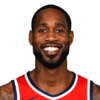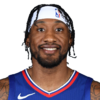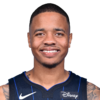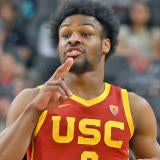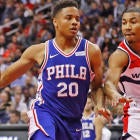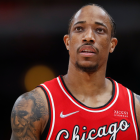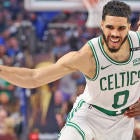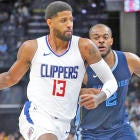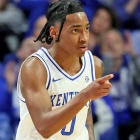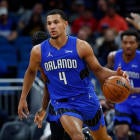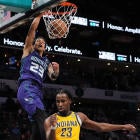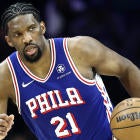There's value to be had in every Fantasy draft. Some players seem to always be selected later than they should be, usually due to a lack of name recognition or numbers that don't pop off the page.
Identifying those players before your draft could help you bolster your team in the mid-to-late rounds. Grab enough of them at the right opportunities and it could help you win your league.
Evans had a resurgent season as the primary offensive focus beside Marc Gasol for the injury-riddled Grizzlies last season. He played only 52 games, himself, but most of those missed contests came late in the season during a clear tanking effort. Fantasy owners could be rightly concerned with Evans' injury history -- he's averaging 58.3 games played per year -- and his joining a team already led by a ball-dominant player in Victor Oladipo.
But Evans still projects to be Indiana's No. 2 option on offense and has had a high statistical floor throughout his career, not to mention his improving 3-point shot. Of Evans' nine NBA seasons, he's seen at least 28 minutes in eight of them. In those eight seasons, his lows are 14.5 PPG, 4.4 RPG, 3.5 APG and 1.1 STL. He also knocked down a career-high 2.2 threes per game last year. While he'll likely come off the bench, Evans' competence at three positions should also keep him in the mix for extra usage if the Pacers suffer an injury in the backcourt or on the wing.
Prince was the Hawks' leading scorer after the All-Star break last season, due in part to Atlanta parting ways with Ersan Ilyasova and Marco Belinelli. Prince posted 19.0 PPG on 44.3 percent shooting, while hitting 3.2 3s per game and converting 89.2 percent of his free throws. He was also proficient in other areas over that stretch, averaging 4.9 rebounds, 3.5 assists and 1.3 steals. Overall, Prince racked up five 30-point games, five double-doubles and had at least three steals on 10 occasions. Considering Atlanta's most talented offseason addition was Jeremy Lin, who is a major injury risk and is unlikely to crack 30 minutes per game, Prince is in an opportunity to be the Hawks' leading scorer for all of this season. At the very least, he's proven to be a reliable source of 3s with rebounding and defensive upside.
Barton had the largest workload of his career (33.1 MPG) last season and started in 40 of his 81 appearances. Providing depth from point guard through small forward, he often saw extended run while the Nuggets dealt with injuries, even playing 40-plus minutes on 12 occasions. Barton was already seeing starter's minutes last season, but he will now officially be the Nuggets' starting small forward with Wilson Chandler in Philadelphia. Barton's Fantasy value is derived from his all-around skillset, as he averaged 17.5 points, 5.3 rebounds, 4.2 assists when seeing 30-39 minutes last season. He also shot 47.4 percent from the field and hit 2.3 threes per game in those contests. And despite transitioning to a starter, Barton should continue to be the first in line for extra minutes, and touches, if the Nuggets again deal with injuries on the wing or in the backcourt.
Ingles became a full-time starter last season, setting career-highs practically across the board. Though he's not a high-usage player -- combined 9.8 field goal and free throw attempts per game -- he continued to be a force from beyond the arc. Ingles made 2.5 3s per game at a 44.0 percent clip, which incredibly marked his second season shooting at least 44.0 percent from distance. The 30-year-old also provided 4.8 assists, 4.2 rebounds and 1.1 steals per game. Plus, he managed to rack up four double-doubles, all coming via points and assists. The Jazz made no offseason additions to threaten Ingles' role, so he should be comparably productive in 2018-19.
Covington has materialized into one of the league's best 3-and-D wings. He made 2.5 3s, swiped 1.9 steals and blocked 0.9 shots per game last season, all while functioning as a role player on a deep Sixers team. Paul Pierce in 2001-02 is the only other player in NBA history to achieve those numbers, needing 40.3 minutes per game to do so. The addition of Wilson Chandler, plus the presence of Dario Saric, may scare some Fantasy owners off. But if the three share minutes relatively equally at the two forward spots, they'd each be in line for around 32 minutes per game. That scenario seems realistic and would continue to give Covington the run he needs to be as productive as last season.
The reigning SEC Freshman of the Year was selected by the Cavaliers with the eighth overall pick in the 2018 Draft. Sexton was aggressive during summer league, averaging 19.6 points on 42.9 percent shooting, which may be a sign of things to come for a Cavs team now devoid of its biggest playmaker in LeBron James. Rookies always present a risk in Fantasy, but selecting Sexton in the final rounds of a draft has payoff some potential. If he doesn't start, he'll be Cleveland's first guard off the bench, and the hope is that he's the long-term future at point guard. Realistically, there's a good chance Sexton will be inefficient as a rookie, but he could nonetheless be a decent source of points, with some assists and steals on the side.
Fultz is a coming off a rookie year that fell somewhere between disasterous and enigmatic. Whether due to injury, a mental block or both, Fultz ended up playing just 14 games and was unable to replicate the shooting form that allowed him to make 41.3 percent of his 3s in college. However, he still flashed plenty of upside in limited action and ended up posting a respectable 14.2 points, 7.5 assists, 6.1 rebounds and 1.7 steals per 36 minutes. The mystery surrounding Fultz's jumper will endure until the preseason, but there's nothing to indicate he won't play meaningful minutes this season. Keeping in mind what he was able to do sans jumper -- small sample size be damned -- Fultz is worthy of consideration late in drafts.



